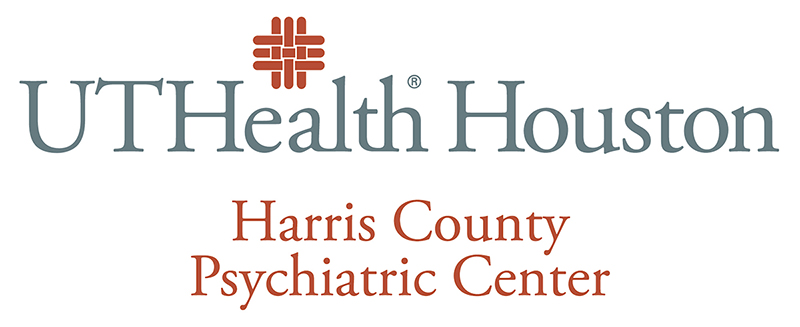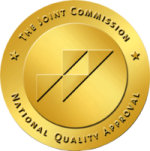UTHealth Houston Harris County Psychiatric Center
Schizophrenia
Types of Schizophrenia • Causes • Signs and Symptoms • Myths • Treatments • Living with Schizophrenia • How Family and Friends Can Help
Schizophrenia, one of the most debilitating and baffling mental illnesses, defines a group of disorders that cause distorted thought and perception. Thoughts can be scrambled or jump from subject to subject. Perceptions can be distorted beyond reality, causing people to see or hear things that are not there.
People with schizophrenia go through periods of getting better and worse --- remission and relapse. They can go for long periods of time without any symptoms, but because schizophrenia is often a chronic illness, it requires ongoing medical attention, like hypertension or diabetes.
Schizophrenia is neither a "split" personality nor multiple personality disorder, a different and extremely rare problem. Though often stigmatized for the behaviors caused by the illness, people with schizophrenia did not bring the illness upon themselves by becoming involved with the "wrong" crowd or interests. And, contrary to the beliefs that are reinforced by movies, television and books, people with the disorder are more likely to withdraw into isolation or become victims of crime than they are to hurt anyone else.
Much less common than other chronic diseases, schizophrenia occurs in around 150 of every 100,000 people, or about one to one and a half percent of the population, and usually appears during adolescence or young adulthood. However, it can be one of the most catastrophic illnesses because it can cause devastating impairments, emotional and financial loss and the need for long-term, intensive medical and supportive care.
Schizophrenia can appear in one of many forms. For example, a person who has constant feelings of being watched, followed or persecuted is said to have paranoid schizophrenia. A person who is incoherent but has no delusions is said to have disorganized schizophrenia. A person who lacks initiative, motivation, social interest, enjoyment and emotional responsiveness is said to have undifferentiated schizophrenia. Schizophrenia can vary in intensity, severity and frequency of both psychotic and residual symptoms from person to person. Therefore, scientists use the word "schizophrenia to refer to a range of illnesses from mild to severe.
Research has not yet identified the cause of schizophrenia. However, most experts agree that a serious of factors combine with a genetic risk to contribute to the start of the disorder.
Just as the risks for diabetes and heart disease are thought to run in families, the risk to develop schizophrenia is often thought to have a genetic link. For example, if one identical twin develops schizophrenia, the other twin has a 50 to 60 percent chance of developing the illness as well.
Exactly what triggers the illness in those with a family risk for schizophrenia is not yet known. Some theories suggest that because schizophrenia most often first occurs during the hormonal changes of puberty, these changes in biochemistry set off the illness in those who are at risk. In addition, viral infection, severe stress such as poverty or violence, and other similar external factors are all viewed as possible causes of the disorder.
Early signs of schizophrenia may not be noticed by family and friends. People who suffer from schizophrenia sometimes display one or more of the following symptoms in the early stages of the illness:
- prolonged feelings of tension
- sleeplessness
- poor concentration
- social withdrawal
- personality change
As the disorder progresses, the symptoms become more intense and bizarre. The person develops peculiar behavior, begins talking nonsense and has unusual perceptions. These more severe symptoms are usually the reason for seeking treatment.
Delusions are unusual beliefs that are not based in reality. For example, people suffering from schizophrenia might believe that someone can hear their thoughts or control their feelings, actions or impulses.
Hallucinations are distortions of the senses. Auditory hallucinations cause people to hear sounds that are not there. Visual hallucinations cause people to see things that do not exist. Tactile hallucinations are sensations without cause, like burning or itching. Olfactory hallucinations, smelling non-existent odors, can also occur.
Preoccupations are thoughts that take on more importance in the sufferer’s mind than they normally would. The same though returns often and can become unrealistic. This may include a preoccupation with health, or “doing the right thing”.
Disordered thinking interferes with planning, motivation and communication. For example, a person may use words that make no sense, or jump from one thought to another unrelated thought.
Social withdrawal causes the schizophrenic to seek isolation. This may include an intolerance of being in crowds, small gatherings or even with just one other person.
Lack of motivation and emotion as well as apathy are symptoms, which are troubling for family members to see in their loved ones. Few people experience all these symptoms at once. Some may occur during the remission phase and may worsen in the most active phase of the disorder.
"Any person with schizophrenia is incapable of making life decisions and requires the help of a legal guardian.”
The diagnosis of schizophrenia does not mean that the person will always be dependent upon others to make decisions and care for them. In fact, most people with this illness handle their own affairs successfully. However, just as people with other medical conditions may have symptoms that cause periods when their ability to make decisions is impaired, people with schizophrenia may require the appointment of someone to handle their affairs for a specified length of time.
"Smoking ‘pot’ can help sometimes more than regular medicine.”
This is a myth. The use of any illicit drug is dangerous and illegal, no matter who uses them. For people with schizophrenia, such use can impair judgment, worsen symptoms and cause interactions with medications. People with schizophrenia often have difficulty with healthy social interaction. Being with people who use or sell drugs can place an already vulnerable person in a potentially dangerous position.
For these reasons, it is important to inform the treating psychiatrist of any substance abuse or use. He or she will recommend steps to take to avoid illicit drug use and deal with the reasons why the medication appears not to help.
"People with schizophrenia are violent.”
Violence is not a symptom of schizophrenia and is not common in people with this disorder. In fact, people with schizophrenia are more likely to become victims of violence themselves. However, if violence or aggression occurs, it usually does when a person feels cornered or misunderstands the intentions of the other person. Usually hallucinations, delusions, preoccupations or jumbled thoughts have caused the fears and misunderstandings that lead to violence.
Like many other mental illnesses, schizophrenia is usually treated with a combination of therapies, tailored to the individual’s symptoms and needs.
Antipsychotic medications under the supervision of a psychiatrist is the treatment of choice for schizophrenia, because the illness is related to biochemical imbalances. These medications can reduce hallucinations, delusions and disordered thinking, but few of them adequately treat the social withdrawal and apathy that occurs in schizophrenia.
As with all medications, antipsychotic medications have side effects. Some, such as dry mouth, dizziness, drowsiness and constipation, go away with time. Other side effects include restlessness, tremor and muscle spasms, cramping or stiffness. An irreversible side effect is tardive dyskinesia, which causes abnormal movements in the mouth, face and later in the arms and legs.
Many of these side effects can be helped or avoided when reported to the psychiatrist. It is important not to abruptly stop taking the medications, increase the medications or take additional medications without consulting a doctor. Such changes can cause relapse or other serious problems.
Medication is usually prescribed through the remission phase of the illness to prevent relapse. Though relapse may occur even when medication is taken as prescribed, taking the medication provides the best protection from future relapse.
Psychotherapy and other supportive therapies address the emotional and practical responses to these illnesses and are typically recommended in addition to medication.
The hallucinations, delusions and isolation caused by schizophrenia can impair a person’s relationships with other people, daily living, spiritual growth and job skills. Individual psychotherapy helps patients to understand their emotions and deal with life’s problems in a more confident, healthy way. Group psychotherapy allows patients to learn social skills and gain emotional support for the difficult times as well as offer support to others.
Occupational therapy helps patients return to daily living skills and routines, which may have been impaired by mental illness. Activity therapy focuses on problems through recreational and group activities.
The outlook for people with schizophrenia has improved over the past two decades. While no absolute cure has been identified, modern treatments have allowed many schizophrenic patients to lead independent, fulfilling lives. It is important, however, that people who might have the disorder be diagnosed quickly so that treatment can begin as soon as possible.
How Family and Friends Can Help
The first way family and friends can help is to take an active role in having the patient seek treatment. The schizophrenic person usually believes that delusions and hallucinations are real and that psychiatric treatment is not needed.
When treatment begins, recognize that many of the antipsychotic medications will likely cause the patient to require more sleep than usual. Also, understand and be prepared to recognize possible medication side effects as well as symptoms that would require contacting the doctor.
Speak clearly and simply. Because the illness can cause problems with thinking, it is helpful to limit conversation to the most simple statements and questions. Recognize delusions and hallucinations as symptoms. The perceptions are real to the patient; do not argue that the delusion is true or false. Pointing out that he or she does not have to listen to the voice or wait for the voice to speak again can be helpful.
Find a way to empathize. For example, the loud music played by the neighbors at night might be interpreted in a delusion as a tactic to control the patient’s thoughts. Rather than insisting that this is untrue, acknowledge how upsetting loud music can be while trying to sleep.
Provide structure. Help the person recovering from the illness to plan the days to include plenty of sleep, healthy food, fresh air, time for exercise, cleanliness and social interaction.
Family and friends should plan ahead and be prepared for possible crises. Medications, phone numbers and other important information and materials should be kept readily available.
Dealing with a relative or friend with schizophrenia can be tremendously stressful. Family and friends can find emotional support, understanding and hope from outreach, education and advocacy groups. Whether you are the victim, a family member or friend, everyone who is affected by this mental illness should seek help.


